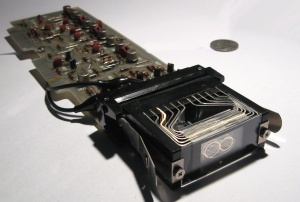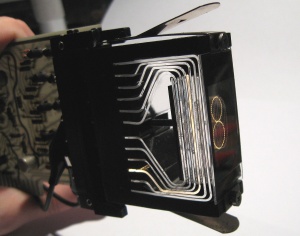Lixie: Unterschied zwischen den Versionen
(Die Seite wurde neu angelegt: „{{Projekt |projectname=Lixie |subcat=Computer, Elektronik |Images={{ProjektImages |projectimage=86.1.jpg }}{{ProjektImages |projectimage=86.2.jpg }}{{ProjektIm…“) |
K |
||
| Zeile 1: | Zeile 1: | ||
{{Projekt | {{Projekt | ||
|projectname=Lixie | |projectname=Lixie | ||
| − | |subcat= | + | |subcat=3D printer |
|Images={{ProjektImages | |Images={{ProjektImages | ||
|projectimage=86.1.jpg | |projectimage=86.1.jpg | ||
Version vom 31. Januar 2019, 04:30 Uhr
|
|
Lixie Basic Data Category: 3D printer URL (first publication): https://hackaday.io/project/18633-lixie-an-led-alternative-to-the-nixie-tube#menu-description
Project status:
Technical documentation Maturity of the project:
no no
Other
Assembly instructions are editable: Bill of materials is editable: Design files are in original format: No Free redistribution is allowed licence: No
Project management
Open-o-meter: 0 Product category: Electronics Contains original non-electronic hardware: Contains original electronic hardware: Contains original software: |
Inhaltsverzeichnis
- 1 Description
- 1.1 "Lixie", an LED alternative to the Nixie Tube
- 1.2 Become a Hackaday.io member
- 1.3 It's long, it's blurry, it is the making of a Lixie (And how boring it is)
- 1.4 A NEW WOOD, A NEW LOOK
- 1.5 A NEW LIBRARY
- 1.6 A WORLD OF LIXIES
- 1.7 Net Neutrality is dead in the US for the time being. This means ISPs will be free to throttle or restrict content at their own commercial will, and has set a very bad precedent for the rest of the world.
- 1.8 Ugh.
- 1.9 Take This Job and Shove It
- 1.10 A Modern Spin On A Retro Tech
- 1.11 Hello again
- 1.12 Laser Cutter
- 1.13 Rolling Order
- 1.14 But First
- 1.15 The next batch of Lixies will be released on June 12th, at 6PM MST
- 1.16 You'll be able get some at the usual place, . Hang in there, they're coming back
- 1.17 Hello again, makers
- 1.18 Manufacturing Update
- 1.19 Accessories
- 1.20 Lixie Project Examples
- 1.21 EOF
- 1.22 OSHW Certification
- 1.23 Lixie's Hardware
- 1.24 Conclusion and Waiting List
- 1.25 Does this project spark your interest?
- 2 + General Reviews
Description
"Lixie", an LED alternative to the Nixie Tube
Always jealous of people who could afford big Nixie Tubes, I rolled my own alternative with WS2812Bs and laser cutting
Become a Hackaday.io member
Not a member? You should
Team (2)
Related lists
Hackaday.io projects you can buy in the Tindie maker marketplace
Just good looking projects made on Hackaday
Interesting/neat projects
This project is submitted for
This project was created on 11/28/2016 and last updated 4 months ago.
I've always been a fan of the Nixie Tube. Beautiful typography, endearing glow, and very clever technology. But when commercial production stopped in the 1990s, prices for surplus Nixie Tubes began to rise. Smaller tubes like the IN-16 are still only about $3.50/piece, but bigger and more desirable tubes like the IN-18 can run up to $45/piece. If you wanted to make a 6-digit clock, it can cost up to $270 just for the tubes And they're potentially dangerous. And they might "burn out" next week. And they need special switching circuitry. And they're old news. So let's modernize the Nixie Tube
- 1 × 1000uF Capacitor
- 1 × Birch Veneer Core (Ponoko)
- 1 × Black Acrylic (Ponoko)
- 1 × Clear Acrylic (Ponoko)
- 4 × M2.5 Nut and Bolt
- • 07/27/2018 at 15:10 •
It's long, it's blurry, it is the making of a Lixie (And how boring it is)
This video has been long overdue, I just never got around to editing it.
Today I'll be taking you guys for a trip around my old office, sharing with you my experiences mass-assembling electronics from home, and showing you how Lixies are built from scratch :)
To order Lixies on Tindie:
- • 07/27/2018 at 03:31 •
Hello, once again It's been a while since we've updated here on , so I'd like to go over a few major notes.
The first of which is that Lixie has dropped in price, and is now $34.99
()A NEW WOOD, A NEW LOOK
As some of you may have noticed, Lixies are now built and sold with a 6.3mm black melamine-finished MDF, instead of the 5.2mm untreated birch they originally released with. This change happened for two reasons:
IMPORT REGULATIONS
Though I don't have all the details, my material supplier for the 5.2mm Birch had to stop carrying the material, due to a change in import regulation/legislation. I've heard from my guitar-loving dad that sometimes this happens due to deforestation issues. Yikes
IT'S JUST A BETTER MATERIAL
Not only are the new black MDF parts easier to match a color scheme with, they're stronger too. Birch had some infrequent but irritating issues with splintering, especially when a shipping courier had roughed it up. I'm happy to report that since the switch to MDF in February, ZERO reports of splintered Lixie parts have come in
A NEW LIBRARY
Though it isn't quite finished being documented, . It uses a hardware timer to keep the displays updated, allowing for non-blocking animation techniques, and it utilizes what I call an LED "mask".
THE ANIMATION MASK
This way, you could have your Lixies do their usual job of displaying the time, date, share prices, etc., while that fiery animation plays out on the "on" segments.
PRESET THEMES
Because of the Lixie's popularity in representing the look of vintage numeric displays, Edgelit includes several preset functions to quickly mimic your favorite retro digits, now including Vacuum Fluorescent Displays:
void nixie(uint8_t argon_intensity = 3); void vfd_green(uint8_t aura_intensity = 3); void vfd_blue(uint8_t aura_intensity = 3);ANIMATION CALLBACK
NOT JUST FOR LIXIE
Edgelit was written to be expandable to other edge-lit displays like mine, such as the already-supported NixiePipe by John Whittington. If you want to build your own displays, or already sell a similar product, compatibility with any WS2812B-based display is super easy to include. Edgelit.cpp has an array of compatible models that you can add your product to like this:
If LED1 on your board pertains to the numeral "3", and LED2 pertains to the numeral "9", and LED3 to "2", etc. then your array looks like this: (3, 9, 2, 0, 1, 6, 5, 7, 4, 8, 3, 9, 2, 0, 1, 6, 5, 7, 4, 8,-1,-1)A WORLD OF LIXIES
In the last two years, Lixie has shipped to almost every corner of the world. If you plotted every Lixie set sold so far on the map, it looks like this:
That is an amazing achievement that I never imagined Lixie reaching. (It seems that
- • 12/14/2017 at 20:09 •
Net Neutrality is dead in the US for the time being. This means ISPs will be free to throttle or restrict content at their own commercial will, and has set a very bad precedent for the rest of the world.
This means that in the future you might not be able to access the Tindie store to purchase Lixies without paying (what will probably be a lot) extra, at least from within the United States.
Anybody have an idea of circumventing this yet so that I can keep my job? Any chance VPNs become illegal in the future? Any insane-scale and awful-but-not-comcast-awful mesh network of routers forming new internets?
Ugh.
- • 07/31/2017 at 22:13 •
Take This Job and Shove It
Let me start this off by thanking you all for the support and rally you gave for the Lixie. I was able to quit my day job to make these full-time - I can support my family, the amount of time I have to continue development has doubled, and nowadays I have to do my inventory audits in weight instead of exact quantities. I never dreamed any of this would happen.
Thank you, Hackaday staff and readers.
A Modern Spin On A Retro Tech
With the extra time I have after letting Lixie become my full-time job, I needed to make sure the interest doesn't die out any time soon. This new ad campaign is centered around a slogan: "A Modern Spin On A Retro Tech" - as the Lixies are. To compliment the slogan, I'm running every ad using vintage graphic design & pop culture from the mid-50s to the late 90s A certain decade has had a revival in the last 10 years - especially after the success of things like Stranger Things, Kung Fury, Halt and Catch Fire, and some reboot films we won't talk about. Let's not forget the synthwave we're often hearing in the air. So to start, we're putting Lixie in the 1980s. Don't get me wrong, there are HUNDREDS of advertising and design subcultures from the era, but so far I've only tackled two of them:
Mid-80s Corporate Electronics Print Ad
The layout was based on , the title is Kabel Black, and the slogan typeface is a free alternative to ITC Garamond, which Apple famously modified and from 1984 to 2001 with the introduction of the iPod. (In fact, - which still used the old font) This peculiar fake is just that - a fake Because the Lixie was almost entirely consisting of CAD parts, a 3D model was already made. I've spent the last week building as close of a replica as I possibly could using Blender/Cycles rendering, which led to this result:
Now I can make videos with impossible angles and settings far beyond my video gear and budget - that are still completely representative of the real product They can be on a table in 1986, (above) in bright daylight (left) or total darkness. (right) In fact, the header image for this log was also rendered
Very Cheesy, But Somehow Extremely Cool
Shiny beveled titles, hyperspace travel, fast motorcycles, and neon grids. I've always been a huge fan of 1980s sci-fi and their enthusiastic cyberpunk futurism. This video starts out normal, but will become a deliberately over-the-top 80s sci-fi/action/tech commercial Of course, it's still a work in progress, and more is to come
I've just received some late parts from China, and the next Lixie batch will be ready in early August. - • 06/08/2017 at 01:38 •
Hello again
It's been quiet here, but not slow I've invested profits from the first Lixie batch into my own laser cutter, nearly finished the assembly processes for a new batch of 60 units, and have heard great news from the users in the first batch
Laser Cutter
Yes, I could have gone for a 40 or 50-watt Chinese CO2 laser. But I'm in an apartment, with understandably strict lease terms about heavy tools and toxic fumes. So I took the safe route for now and picked up a 4-watt diode cutter. It works for the birch and black acrylic, but isn't strong enough to work with the clear acrylic digits of the Lixies.I live in Utah, so I'll probably re-purpose it to cutting fancy parchment to make me rich in the rushed-marriage capitol of the world. ;)
Rolling Order
Since it's kind of a pain in the ass to wait a month or two between batch releases, Lixie production will be converted to a "rolling order" system. With some properly timed shipping, I can begin releasing 40 Lixies to the wild, every week. The demand is definitely there, considering both the launch and current waiting list have had over 600 units in each
But First
This next batch will be 60 units. A bit bigger than the last, it'll fund the extra upfront cost needed for the rolling order shipping.
The next batch of Lixies will be released on June 12th, at 6PM MST
You'll be able get some at the usual place, . Hang in there, they're coming back
- • 04/03/2017 at 01:48 •
- • 01/11/2017 at 20:17 •
- • 12/28/2016 at 15:17 •
Hello again, makers
This week, I've got an update on Lixie manufacturing, a new accessory in the works, and a bunch of cool code examples
Manufacturing Update
I've ordered the final revision of the Lixie PCB for testing from DirtyPCBs, and as soon as it arrives and passes, I'm committing to a 200-unit run from Elecrow I've already ordered 50-units-worth of every electrical part, and waiting until my next check to order all the laser cuts, so we're still on schedule for mid-January.
Accessories
A new development for Lixie is a daughter board, simply named "Lixie USB". This will bolt on underneath the first Lixie in your chain, and solder through to the input pads. As of writing this, it has an ATMEGA16u2 on board, which can be programmed with the Arduino IDE right over the USB port You can also power your Lixies with micro-USB with this board. This allows for two types of setups:
- Program any Lixie code you want straight to the ATMEGA, for a standalone system
- Program a Serial JSON Parser sketch to the ATMEGA, and control Lixies over USB from a computer, Raspberry Pi, and more
Also in the works in an ESP8266 daughter board w/ microUSB for standalone WiFi Lixies
Lixie Project Examples
Because we're nearing the Lixie launch, I've gone ahead and begun programming a bunch of projects you can use right out of the box
NTP Clock
The most obvious use for Lixies is a clock By driving these with an ESP8266, you can flash this for a self-setting NTP Clock
Live Wordpress/PHP Visitor Counter
This is a live Google Analytics-style counter of active users on your Wordpress/PHP site
OpenWeatherMap Display
Another good use for an ESP8266 connected Lixie is a live weather display The temp/humidity/pressure is shown in the numbers, and the weather status (clear/rain/extreme/etc) is shown in the color
Ping Speedometer
Using an ESP8266, you can have a live network latency monitor This code pings Google often, and shows you the response time in milliseconds. The Lixies are also colored a range from green to red based on latency good/bad thresholds you set
Streamer
I'll be adding more logging services soon, but for now you can stream a field of your choice from any log Lixie will show the latest entry of a numeric field, such as temperature, wind speed, CPU load, or any number you can push
Nest Thermostat Display
This one is a bit different, as it requires the Serial JSON Parser mentioned above, and a Raspberry Pi. Unfortunately, the only way to do more complex internet tasks like OAuth2 is by using a computer like a Raspberry Pi. Pretty soon I'll be porting the Lixie Library to Python so that you can drive a Lixie chain directly from an embedded computer, but for now you'll need the USB-Serial setup.
Pi > USB > Arduino > Lixie
This is a script that connects to your Nest Thermostat over their cloud API, and returns the current measured temperature, coloured by the system status: orange = heat, cyan = cool, white = off.
EOF
All of the above projects - and there's more every day - are on the Once again, thank you all for the support, pull requests, and a big thanks to the 83 people on eagerly awaiting the arrival of their Lixie displays
- Connor
- • 12/17/2016 at 06:48 •
I've never been one to deliver lines well from a script, but here's a more personal update delivered in video :)
Here we see the awesome black WS2812B LEDs Before ordering, I didn't even know they made these Here is a view of two Lixies doing the "color count" test:
Bought a second card table just for assembly
And here are some Lixies cooking in the oven I highly recommend reflow soldering if you've never tried it, you'll save hours of your life with every product ;)And here's a 360 view of a Lixie assembled with nitrile gloves in a clean environment like yours will be:
- Connor Nishijima
- • 12/12/2016 at 02:49 •
Today, by the Open Source Hardware Association (OSHWA for short.) This means that a member of the OSHWA board has manually checked that I'm properly sharing all documentation in an open, (Fritzing) or "free" format. (Eagle Free Version)
Because of this, I'd like to cover two things:
- The OSHW certification process
- Lixie's open hardware
OSHW Certification
After seeing a few months ago, I decided that the Lixie display would be as open as possible. There's nothing you can do to stop a copy cat, so you might as well be friendly
If your idea can be sold, it will be.On December 9th, I submitted Lixie's documentation (available on the Github) to OSHWA . The "Certification Mark License Agreement" took about 30 minutes to complete with reading to make sure I wasn't signing my soul to the devil, but I was very pleased with the terms. For those of you unfamiliar with the OSHW mark, it's fairly new and very cool
The OSHW logo is a new iteration of the Open Source Hardware . This gear is still valid, but has one issue: anybody can use it. This means that people who weren't open sourcing at all were using the logo purely for promotional reasons. () The new (OSHW) logo solves this by requiring manual approval of it's use per project with their certification process.
OSHWA replied within 48 hours, on a weekend, with my official OSHW UID of "US000054"
Please note however, the OSHW mark is *NOT* a licence protecting the hardware from being closed by a third party, it's just a certification mark. You'll still need to bundle in a licence like I use on all of my work.
Lixie's Hardware
In the spirit of being as Open as possible, let's take a thorough look through how Lixie works
Concept
Lixie works by shining light through the edge of a clear acrylic. When the light hits an engraving or edge, it scatters in a different direction, and lands in your eye This allows the flat surfaces of the acrylic to stay clear, and have only edges light up Now put ten pieces in a stack, each marked with a different number 0-9, and you can show each number individually, on a clear surface
To do this well, we need two things: plate separation and a light filter. Adding a gap between plates prevents light from jumping between them, and a filter at the base prevents an LED from lighting any plates but the one it's supposed to.
Plates
Each of the ten plates has a number on it, 0 through 9. For maximum light output, these numbers are actually cut all the way through the acrylic, with little connected areas left on numbers like "9" so that no areas are completely cut out. (Think pumpkin carving). Most laser cutters are able to produce cuts of a certain depth as to not completely cut the material, but I use Ponoko for cutting these, which only allows very shallow engraving or full-blown cutting. Each plate is separated by a 1mm air gap.
Filter
A light filter is used to prevent LEDs from lighting plates they shouldn't. Each plate has two legs leading down to two slots, over two LEDs. This filter, and the PCB beneath it, are specifically designed so that the three anodes of the 5050 RGB LEDs are centered under the slots.
Printed Circuit Board
The Lixie actually has a very simple PCB, with some very specific dimensions. To fit all of the LEDS in, they have to be staggered diagonally. Each acrylic digit has the two lightpipe legs in different spots for this reason. As mentioned above, the LEDS are also placed JUST right so that the anodes for red, green, and blue are centered under the filter slots.
Conclusion and Waiting List
I know some of you are waiting very anxiously for Lixie to go on sale, and I have good news You can hop on a waiting list for the Tindie listing today Sales will be shipped in the order received, so if you want to be an early adopter, go ahead :) You won't be charged
Enjoy this project?
ShareDiscussions
Are you sure?
Are you sure?
Are you sure?
Are you sure?
Are you sure?
Are you sure?
Are you sure?
Are you sure?
Are you sure?
Are you sure?
Are you sure?
Are you sure?
Are you sure?
Are you sure?
Are you sure?
Are you sure?
Are you sure?
Are you sure?
Are you sure?
Are you sure?
Are you sure?
Are you sure?
Are you sure?
Are you sure?
Are you sure?
Are you sure?
Are you sure?
Are you sure?
Are you sure?
Are you sure?
Are you sure?
Are you sure?
Similar Projects
Does this project spark your interest?
to follow this project and never miss any updates
By using our website and services, you expressly agree to the placement of our performance, functionality, and advertising cookies.
Report project as inappropriate
You are about to report the project ""Lixie", an LED alternative to the Nixie Tube", please tell us the reason.
Send message
Your application has been submitted.
Remove Member
Are you sure you want to remove yourself as a member for this project?
Project owner will be notified upon removal.
+ General Reviews 
Public cad repository for non-electronic hardware
Public cad repository for electronic hardware
Bill of materials
Contributing guide
Link github





